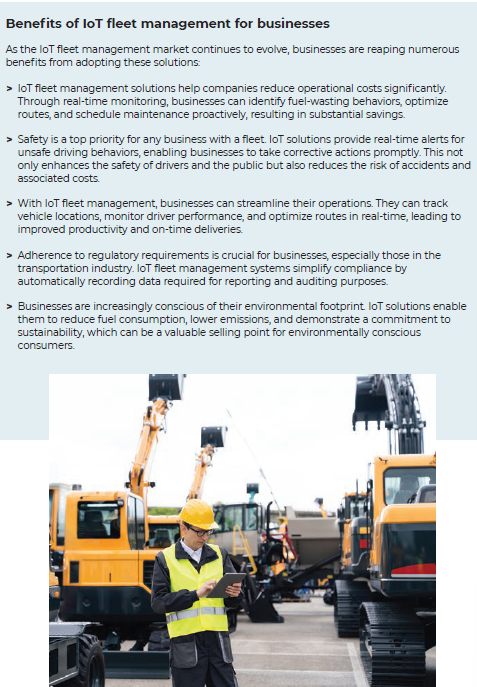IoT’s impact on business operations

As businesses are heavily relying on efficient transportation and logistics to keep their operations running smoothly, the importance of Internet of Things (IoT) is being felt even more. The advent of the IoT has brought about a significant change in the way companies manage their fleets. IoT fleet management solutions have come out as an imperative part of businesses, offering real-time insights, cost savings, and enhanced safety. This article will discuss the recent developments that are shaping the industry.
The market is set to reach new heights
The IoT fleet management market has witnessed significant growth over the past decade, and the trend is expected to continue. As per a report published by Allied Market Research, the global IoT fleet management market is estimated to bring forth a noteworthy compound annual growth rate (CAGR) from 2021 to 2031. This surge in demand can be attributed to several factors.
One of the main reasons behind the growing fleet management market is the strong demand from businesses. Rising fuel prices and environmental worries are pushing companies to cut down on fuel use and emissions. In this context, IoT fleet management solutions play a crucial role. They allow companies to keep an eye on how their vehicles are performing in real-time. Additionally, they help identify areas where improvements can be made and enable quick corrective actions.
Moreover, with the regulatory requirements becoming increasingly stringent, use of advanced technologies like IoT has also become a preferred choice in terms of tracking vehicle data accurately. This includes compliance with electronic logging devices in the United States and similar regulations in other regions. Apart from helping companies adhere to these regulations, IoT fleet management systems also simplify reporting and reduce the risk of fines.
IoT fleet management in the mining industry
IoT technology has almost revolutionized the mining industry. An IoT fleet management in the mining industry refers to the use of connected sensors and devices to monitor equipment and vehicles used in mining operations. Here is a closer look at how IoT fleet monitoring is transforming mining businesses.
Enhanced efficiency: By tracking the status of mining vehicles and equipment in real-time, IoT-enabled sensors have improved mining operations to a significant extent. Operators can use remote monitoring to keep an eye on how much fuel is being used, check the condition of equipment, and see how well it is working. This helps with planning maintenance, cutting down time, and ensuring machines are running at their best.
Safety: Safety is a top priority in the mining industry. IoT technology can offer real-time information about where vehicles are and how they are being driven. If some mishap happens, it can instantly notify the drivers so they can act quickly to help the situation.
Cost savings: Mining companies can save money by using IoT technology to improve route planning and reduce fuel usage. Additionally, they can also prevent costly breakdowns and extend the lifespan of equipment.
Data-driven decision making: IoT fleets produce a lot of data that can be examined to make smart decisions. This information can reveal how well a particular equipment is working and how operators are behaving. It helps businesses make better choices for higher profits.
Environmental compliance: Mining companies are under growing pressure to reduce their harm to the environment. They can make the most of IoT technology to track things like emissions and energy usage, which helps them keep a closer eye on their environmental impact and comply with regulations.
Productivity: Finally, IoT can improve the productivity of mining operations by optimizing work processes. For example, automated vehicles and equipment can work longer hours and in harsh conditions, increasing overall productivity.
Some recent developments in the industry
With the increased number of companies constantly innovating to meet the evolving needs of businesses, the IoT fleet management market has become highly dynamic.
For example, Verizon Connect recently launched its ADAS solution to improve driver safety. This system facilitates IoT sensors to provide real-time feedback to drivers, helping them avoid accidents and perk up fuel efficiency altogether. The solution includes features like lane departure warnings and forward collision alerts, which are increasingly sought after by businesses looking to prioritize safety.
At the same time, sustainability has become a growing concern for businesses across the world, and Samsara’s latest product launch is a perfect example of this. Their sustainability dashboard provides companies with insights into their carbon emissions, enabling them to track progress toward sustainability goals. This product goes in tandem with the increasing emphasis on corporate social responsibility and sustainable practices.
Another major player in the market, Geotab has brought forth its advanced data analytics platform. This tool helps businesses make informed decisions by analyzing a pool of data collected from their fleets. From predictive maintenance to route optimization, Geotab’s platform empowers companies to improve efficiency and curtail operating costs.
Acquisitions that have boosted the market growth
In addition to product launches, acquisitions have also played a significant role in shaping the market. Companies are acquiring others to expand their offerings and reach a broader customer base.
Verizon has acquired Movildata, a Spain-based telematics company, in a move to strengthen its presence in the European market. This acquisition allows Verizon to tap into Movildata’s expertise in fleet management solutions, providing a broader range of services to businesses operating in Europe.
Trimble, known for its advanced GPS technology, acquired Kuebix, a transportation management system (TMS) provider. This strategic move allows Trimble to integrate Kuebix’s TMS with its IoT fleet management solutions, offering customers a comprehensive logistics platform that covers everything from planning to execution.
Challenges and considerations
While the benefits of IoT fleet management are undeniable, businesses should also be aware of the challenges and considerations that come with implementing these solutions.
The upfront cost of implementing IoT fleet management can be substantial. However, the long-term savings in operational costs often outweigh the initial investment. Simultaneously, IoT solutions also involve the collection and transmission of sensitive data. Ensuring data security and compliance with privacy regulations is paramount to protect both the business and its customers.
Moreover, Integrating IoT fleet management systems with existing software and processes can be complex. Companies should carefully plan and execute the integration to maximize the benefits.
Drivers may initially resist the implementation of IoT solutions because of concerns about privacy and surveillance. Clear communication and training are essential to gain driver acceptance.
To conclude, it can be asserted that the IoT fleet management market is evolving rapidly, providing businesses with huge opportunities to improve efficiency, reduce costs, and enhance safety. When the new product launches highlight the market’s evolving dynamism, the significant acquisitions by the top players pave the way for lucrative opportunities in the industry. As there is increasing pressure for businesses to operate sustainably and adhere to the regulations, IoT fleet management solutions are gaining much prominence.
While the initial investment and integration hurdles may appear a bit challenging, the long-term benefits of IoT fleet management are worth considering. With the high-end advancement of technologies on board, businesses must make the most of these innovations to ensure the smooth operation of their fleets in today’s competitive scenario. It is expected that in the coming years, even more exciting developments will set foot in, further reshaping the future of fleet management to new heights.
Koyel Ghosh is a content team lead at Allied Market Research. She is a blogger with a strong passion and enjoys writing in miscellaneous domains.

Comments